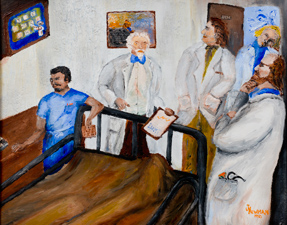Vital signs are vital
Introducing a new series that highlights the importance of vital signs.
Morning rounds are under way at the VA Hospital. The paint is peeling off the walls; the facility is aging less than gracefully. The team enters the room, but the patient merely lies there, not responding to questions. His surgery, an above-the-knee amputation, was 3 days ago. Just outside the door, an angel waits to collect his soul.
One medical student stares at a framed picture, imagining himself with his lady love on a cliff at sunset. Another student leans her head against the wall, half asleep. The intern holds a medical manual in his hand, but is contemplating the Bible on the table.

The attending holds a clipboard in his hand, incensed. He points towards the data on the vitals sheet. Had nobody looked at the vital signs? The temperature going up, along with the pulse rate, and the blood pressure dropping: These are clear signs of hypotension, tachycardia and postoperative sepsis.
I, the resident, am contemplatively befuddled. I'm wondering what is happening with my patient and my service. I look across the room to the TV. The Wheel of Fortune is spinning, but the prize for this patient is nothing you'd want to win. Vanna White wears a death's head mask and I realize, reading the letters, that the patient is Toxic, Septic, Coding … and Deceased.
It's a classic failure to rescue. If we had only looked at the vital signs, maybe we could have intervened. But how many times have you heard a case presented with no vital signs given? Too many, I'd bet.
Vital signs are vital, an essential part of the physician exam, yet often neglected. Over the course of 2014 we will explore the vitals from a clinical, historical and cultural standpoint. When did blood pressure become recognized as a key factor? Who first used a thermometer and tracked the nature of fever? When were patterns of respiration first noted? When did we first begin to measure oxygen saturation? And when did pain become a vital sign?
Teaming up with medical students, residents and fellows, we will give the vital signs their proper due. We hope you enjoy it, and learn something too.



